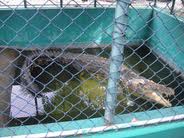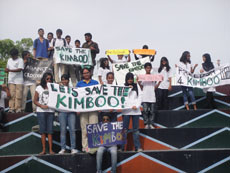In January 2013, parliament’s Government Oversight Committee heard testimony from six of the highest-ranking officers of the police and military for its review of the Commission of National Inquiry’s (CoNI’s) report into the transfer of presidential power on February 7, 2012. Minutes of the closed-door sessions (Dhivehi) along with audio recordings were made public on January 16, 2013.
Following is a translated summary of the testimony from former head of police intelligence Chief Superintendent Mohamed Hameed to the oversight committee on January 9, 2013. Hameed was fired in August 2012 by the police disciplinary board over allegations of leaking confidential information. He has since sued the police for unlawful termination.
Mohamed ‘MC’ Hameed joined the Maldives Police Service (MPS) on April 8, 1995. He was appointed head of the police intelligence department on January 17, 2010 following completion of a state-sponsored Masters degree in policing, intelligence and counterterrorism from the University of Sydney, Australia.
“I attended CoNI on April 15, 2012 and in addition I also attended the reconstituted CoNI. I believe it is because they did not consider what I said there to have much weight that important points from my two statements to CoNI were not highlighted in the report. The reason I am saying this is because what happened on February 6, 7 – I am not a legal expert but I have worked in the police profession for a very long time – I believe what happened with the police those two days should not have been seen from those belonging to a professional police service.”
Hameed believed that elements of the police mutinied on February 6 and 7. The CoNI report however did not highlight police misconduct, alleged brutality and disobedience that he “emphasised” at the commission.
When the new administration took office in November 2008, MPS did not have “a professional intelligence setup.” The previous intelligence department, known as Omega Sector, was referred among police as the “black room”. It was headed by current Commissioner of Police Abdulla Riyaz.
Police intelligence was focused on the political opposition to the then-government and did not provide much assistance or cooperation for routine policing. Hameed’s “main purpose” as the new head of police intelligence in 2010 was “setting up an intelligence mechanism needed for policing or law enforcement.”
At CoNI, Hameed was asked why police intelligence had not learned of a plot to overthrow the government if the events of February 6 and 7 were orchestrated and planned in advance.
“I said very clearly, if intelligence operated in the way it did in the police service before 2008, the incidents of February 6 and 7 would not have happened. It would not have been allowed [to happen].”
Gathering information from the political arena was “not a priority at all” for the department. However, the intelligence department did monitor political activities, especially protests or demonstrations that affect public peace.
“Considering the information I was receiving in my post, I do not believe what occurred on those two days happened spontaneously.”
Police received intelligence that plans were made to carry out anti-government activities with police involvement to disrupt a mass gathering planned by the formerly ruling Maldivian Democratic Party (MDP) for February 17, 2012 as part of its campaign for judicial reform.
“We had learned that discussions took place. This information would be recorded in the Maldives Police Service intelligence department intelligence reports and intelligence logs.”
On the night of February 6, when clashes erupted between opposition protesters and government supporters at the artificial beach, the intelligence department was monitoring the situation. Communications from the mutinying police from the Specialist Operations (SO) department at Republic Square were being intercepted.
An off-duty platoon from the SO was active at the artificial beach without orders.
Following the military’s detention of Chief Judge of the Criminal Court Abdulla Mohamed on January 16, 2012, anti-government graffiti was discovered in the toilets of the SO accommodation block at Iskandharu Koshi. The graffiti called for Police Commissioner Ahmed Faseeh, Deputy Commissioner Ismail Atheef and President Mohamed Nasheed to be killed.
“I believe that police as a whole was not ready for democratic governance. There were serious problems in the institution.”
The judge’s arrest sparked demonstrations by the opposition coalition for 22 consecutive nights. During that period, police would gather at the Republic Square at 7:00pm every night and follow the protests until 2:30am or 3am.
“The sole focus of police was on these demonstrations. During the whole day, the police service was almost asleep.”
On January 23, 2012, the intelligence department prepared an assessment report of the situation with a recommendation for the Commissioner of Police to seek the release of Judge Abdulla from military detention and find “another settlement” of the issue.
At the demonstrations outside the Maldives Monetary Authority (MMA) building, opposition leaders were publicly claiming that police and army officers would join their protest.
On January 17, 2012, ten senior police officers above the rank of chief inspector met with the Commissioner of Police and informed him that they “did not accept” having to control the protests against the judge’s arrest. The ten senior officers were in charge of police operations.
“One of them indirectly proposed that the commissioner resign that very day.”
In the coming days, police intelligence learned that some of the senior officers had separate meetings with the current Police Commissioner Abdulla Riyaz, State Minister for Home Affairs Mohamed Fayaz ‘FA’ and Defence Minister Colonel (Retired) Mohamed Nazim.
The ten senior officers were also noticeably absent from the police headquarters during the operations to control the opposition protests.
On January 18, 2012, President Mohamed Nasheed met with police officers of commissioned rank at the police headquarters theatre hall and attempted to explain the reasons for the judge’s arrest. A few days later, an audio clip of President Nasheed’s talk was leaked and broadcast on opposition-aligned DhiTV and Villa TV.
A police officer of a junior rank was meanwhile caught relaying information of the operation to opposition politicians leading the demonstrations. Riot police officers were also seen to be reluctant in taking action against unruly demonstrators.
A few nights before February 6, opposition protesters marched to the Maldives National Broadcasting Corporation (MNBC) building, located near the ruling party’s Haruge (meeting hall). In response, a group of MDP activists led by MDP MPs made their way to the Supreme Court building and MMA area.
In contrast to their attitude towards opposition demonstrators, SO officers deployed at the MMA area forcibly broke up the MDP protest as soon as it reached the police lines.
Police intelligence learned that a SO officer called Progressive Party of Maldives (PPM) MP Ahmed Mahloof later that night and bragged of having beaten up MDP supporters. In the intercepted call, MP Mahloof asked the officer why they did not break the leg of MDP MP ‘Reeko’ Moosa Manik at the protest.
Based on such intelligence information, the assessment report prepared on January 23 warned that the likelihood of “police and army officers coming out against the government” was high.
In the early hours of February 7, the special assessment unit of the Maldives National Defence Force (MNDF) responsible for intelligence regarding domestic security relayed information that PPM council member ‘Marz’ Ahmed Saleem was coordinating efforts to send speedboats to Dhoonidhoo and Feydhoo Finolhu to bring more police officers to join the mutinying police at the Republic Square.
Police intelligence also learned that some army officers inside military headquarters told the mutinying police around 4:00am that the soldiers would join the mutiny if they held on for four more hours. The intercepted calls between army and police officers were provided by MNDF intelligence.
At 10:30am on February 7, mutinying police assaulted Hameed and other senior officers inside the conference room on the 5th floor of the police headquarters and dragged them out “by the cuff”.
Hameed made his way to the office of the Police Commissioner on the 4th floor. At 11:00am, Chief Superintendent Abdulla Fairoosh came into the office, sat down and informed the commissioner that a team was going into the military headquarters to give President Nasheed an ultimatum. Fairoosh asked the commissioner what he intended to do.
“I took that indirectly [to mean] ‘I am taking over, so the commissioner of police should step aside or resign.’”
The commissioner then went to the conference room and made his parting remarks. All commissioned officers in Male’ were present, some in uniform and others in plainclothes. After the commissioner left, a vote was taken among the senior officers to appoint Fairoosh interim commissioner. Two assistant commissioners were present.
After Fairoosh took charge, Chief Superintendent Ahmed Saudhee then told Hameed that he was no longer head of the intelligence department. Hameed was to be replaced by Chief Inspector Abdul Mannan Yoosuf, who had been studying Business Administration in the UK and was in Male’ at the time on holiday.
Following the appointment of Abdulla Riyaz as commissioner on the night of February 8, 2012, Hameed was made a member of the executive team and appointed head of the service development directorate.
Earlier in the day, confronted by thousands of MDP supporters in a march across Male’, Hameed saw that the senior officers were “in shock” and appeared not to have command and control. Individual officers at the scene acted without orders.
As vice chair of the promotion board, Hameed also noted that 1,112 police officers were promoted on March 31, 2012 while only 600 forms were submitted under the normal promotion procedure. Commissioner of Police Riyaz had instructed heads of directorates to submit a list of officers in their departments for promotion.
Under promotion rules that were supposed to have been amended by then, the commissioner is authorised to “deviate from the normal promotion routine” and promote officers who have shown “special” qualities or exceptional performance.
The new lists were hastily approved during a promotion board meeting after midnight on March 31 while the promotion ceremony was scheduled for 10:00am the next morning. The board meeting was chaired first by Commissioner Riyaz and then Deputy Commissioner Hussain Waheed. The latter was receiving phone calls as late as 3:00am to add new names to the list of officers to be promoted.
Hameed’s objection to promoting officers suspected of brutality and breach of ethics on February 6, 7 and 8 was ignored. SO officers involved in the events were given single and double promotions.
“What we saw was that officers with a disciplinary record from the floor to the ceiling were given promotion by the executive board.”
Hameed further noted that failure to preserve CCTV footage from February 7 cast doubt on the “integrity of the current [police] leadership.” The footage was automatically wiped out on March 7, 2012.
Likes (0)Dislikes
(0)Dislikes (0)
(0) 

